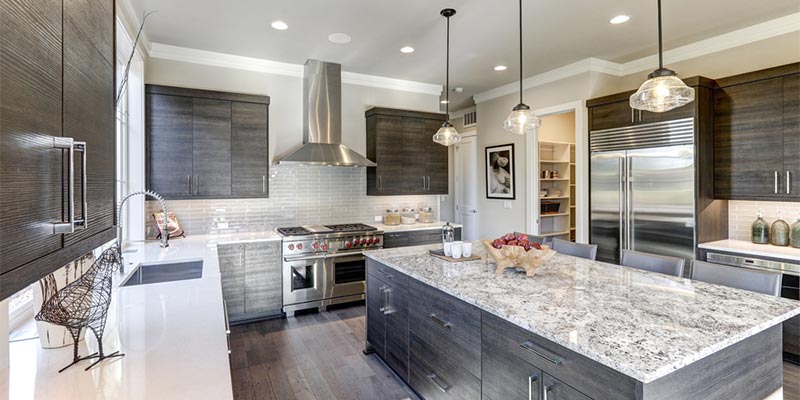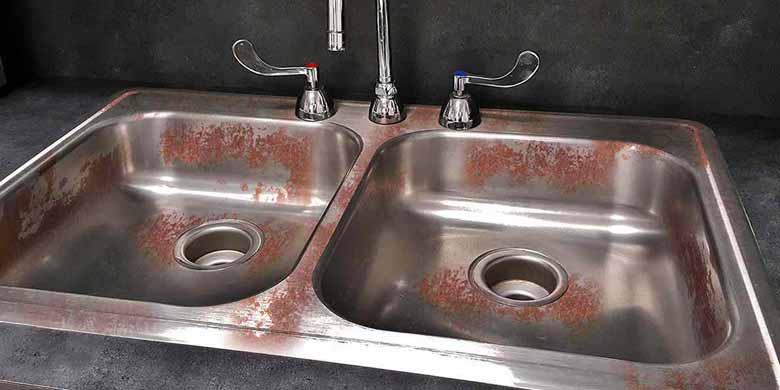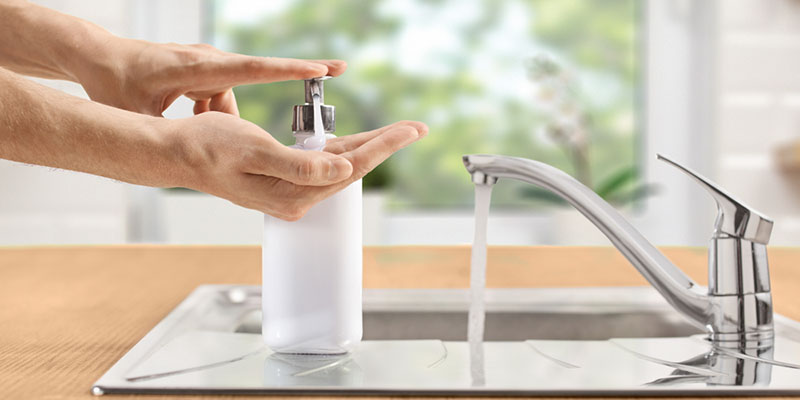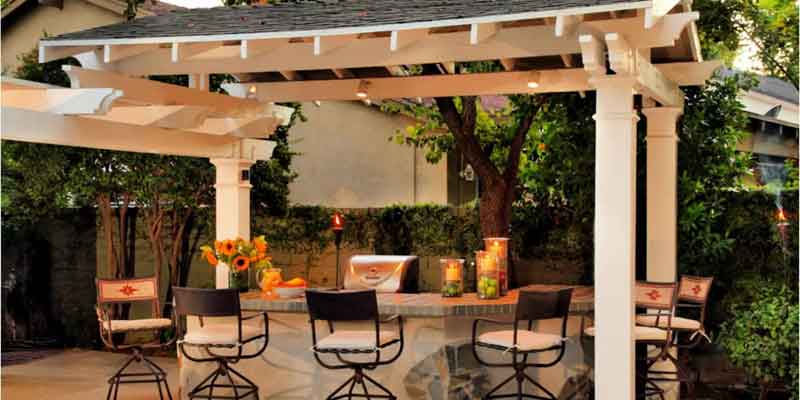A Quick Guide To Slate Kitchen Countertops

Slate Kitchen Countertops
Homeowners love to have slate kitchen countertops because these are durable, affordable, and attractive as well. If you want to spruce up your kitchen and add style to it, you should read this article on a quick guide to slate kitchen countertops.
If you are a novice homeowner and need to know a lot the slate kitchen countertops, you should not think it anymore. Just go through the whole article and you’ll get to know everything regarding slate countertops.
So, let’s just get to the point without wasting a second more!
What is Slate?- Basic Know-What
Although homeowners do not widely use slate countertops, yet it’s one of the versatile materials having a long history of being used for stepping stones, flooring, roofing, billiards tables, gravestones, and so on.
 Slate is widely used as a chalkboard which may remind you of two phrases “clean slate” and “blank slate”.
Slate is widely used as a chalkboard which may remind you of two phrases “clean slate” and “blank slate”.
However, when you ask what slate is, the simplest answer is- it’s a metamorphic rock that is nothing but a formation of volcanic ash and sedimentary clay. So, yes, it’s something similar to granite or marble (natural stones). And, soapstone is the most relatable stone to slate.
Primarily, Brazil and Spain are the countries from where slates come. However, Africa, China, the United States, and the United Kingdom are also known well for supplying slates. More specifically, New York, Pennsylvania, and Vermont supply the biggest amount of slates in the US.
And, especially for the kitchen countertops, the most famous slate is Vermont slate- it’s a high-quality, durable, and hard enough slate that works great for kitchen countertops.
Pros and Cons of Slate Kitchen Countertops
To understand whether slate material is the fit for your kitchen countertops, it’s important to know the pros of cons of slate kitchen countertops. So, here you go.
- Slate countertops do not require sealing (though it varies from slab to slab)
- It’s quite easy to clean
- Embrace the feature high stain resistance (it also varies from slab to slab)
- It’s anti-bacterial (no need to worry growing mold or mildew)
- It will not scorch from hot pans cause it embraces the feature- heat resistance
- Seams are not too much visible
- If you can purchase the right type of slab, you will find it hard enough and durable
- You can fabricate a slate sink for matching the countertops
- It will look amazing in a classic or rustic kitchen design
So, these advantages you will get when you choose a slate kitchen countertop. But guess what? There’s no kitchen countertop that’s perfect from all sides. But, as you know the good things will outweigh the bad.
However, the most important thing you should remember is, slate countertops will last long only if you can purchase the right slate slab. It will be easy to maintain as well.
- In case, you are failed to buy the perfect slab, it may come with fragile edges and corners that may crack and chip
- Scratches may come up
- Under too much weight, there’s a risk of being cracked
- You will find a limited color option than the other materials of countertops
- It’s not for polishing to a glossy shine
- Slate slab requires a bit more seams and are smaller than the other types
How is The Quality of the Slate Countertop Tile and Slabs?
You can relate the slate stuff most with the saying… “your life is a box of chocolates as you never know what you are going to get”.
Slates are always a combination of minerals, although which ingredients will be there it varies widely. For this, there will be a huge variation in both the performance and physical characteristics of the sabs, even it differs from color to color as well. In this case, marble and granite also have their variations but slate countertops have the most extreme range.
You will find some of the slate countertops too durable, predominantly, when you buy a high-grade slate slab, it’s hard and durable. Also, it should be non-absorbent and dense, should not need sealing, should not stain or scratch so easily.
And, most of the high-quality slate countertops come in dark colors although each dark color does not possess all the desired characteristics. Therefore, it’s important to choose them carefully.
On the other hand, some of the slate slabs are disappointingly fragile and weak. If you intentionally or unintentionally purchase a low-quality slab, chances are it will be porous and stain fast. Also, these countertops can easily scratch, crumble, and flake.
Color Variations of Slate Countertops
Right after you hear of the word ‘slate’, you may imagine something really gloomy, gray in color, right? Yes, of course, the black and gray slates look more than amazing in a classic white or black kitchen design, yet, you will find them in various vivid colors as well.
The other familiar colors of slate countertops are green, copper, red, brown, purple, and gold, and it also depends on the materials of the slates. Not only this wide variation of the colors, but you also will get a lot of variations in the design of your slate countertops.

However, if your slate countertops get exposed to the atmosphere right after you cut them into tiles or sabs, you may find a change in their color. This change can be either an amazing benefit or a drawback, it totally depends on your taste.
If you’re one who doesn’t like this type of color change, well, you can choose a variety that is unfading.
And, if you want to go for a vibrant color, you should be careful while choosing it. Slates that come with color variations have a huge variance in their quality and durability as well. You should make it 100% sure that you are going to purchase a durable and hard slate that is not prone to stain, flake, or chip easily.
So, yes, for any kind of, no matter if it’s modern or traditional decor, slate countertops are always the option to choose.
Costs of Slate Countertops
The cost of slate countertops depends on some variables below:
- Slab vs tile
- Color (the least expensive slates are gray and blue-colored ones)
- Where the slate comes from
- The type or texture of the finish (honed, cascade, and cleft)
- Grade or quality
You may hear somewhere else that slate is a cheaper material than granite, quartz, and concrete countertops. Well, yes, that’s true but only for the slate tiles. Tile countertops are always a cheaper option but are a bit hard to maintain.
To make it clearer, you will get a slate slab countertop at $65-$115 for one square foot. On the other hand, you need only $45-$70 for one square foot when it comes to slate tile countertops.
Also, there are some other factors that influence the total cost of your countertop configuration. For example, the cutouts’ number (, sinks, cooktop) as well as the countertop configuration’s complexity (corners, angles, seams), these influence the overall cost.
Finishes for Slate Countertops
Well, there are 3 types of finish or surface texture, whatever you say, for slate countertops. Which type you are choosing has an impact on the maintenance, performance, repair options, durability, and total costs.
Natural Cleft Finish
The first finish we are going to talk is a unique finish for slate. Slate originates in the earth’s layers and the cleft surfaces take place naturally during the slate is being cut. What it means is, natural cleft finish is not a bit similar to the man-made countertop finishes.
Within all the slate countertops, cleft texture is a default finish. Moreover, you can cut the slate in a special way if you want to. The outcome of a cleft finish will become something rough and earthy texture. Ultimately, you will get a rustic kitchen design.
However, a natural cleft finish is the most pocket-friendly but the hardest-to-maintain type of all other finishes. Although the rough texture works great for hiding smudges and scratches, you may find all of it a bit troublesome when it comes to maintenance.
For example:
- Areas that are being heavily used, the texture can chip, wear down, or flake in those areas.
- There will be dust and debris, or grime on the rough ridges of your countertops.
- If you make any repairs, those repairs to chips or scratches will become visible because it’s not possible to completely restore the finish and get back to the original cleft texture.
Cascade Finish
If you consider the degree of texture and from the cost, the cascade finish is in the middle of the cleft and honed finishes. Although cascade finish is almost a flat finish, it comes with a sweet effect.
Cascade finishes can camouflage the smudges and scratches way better than the honed finishes although cascade is way easier to clean as well as maintain compared to honed.
However, cascade finish also cannot solve the problem- when you make a repair, it won’t become completely restored and get back to its original state.
Honed Finish
The surface of a honed finish is completely flat and silky smooth, as well as similar to a soapstone. A honed finish may come with a soft brightness, yet you cannot polish the slate as a fully glossy shine such as a granite.
If you are obsessed with a minimalist look or something like a classic black-white kitchen decor, a honed finish will be the choice. And, if you pair slate countertops with wood, it always looks great.

The issue is, there’s a lack of texture in honed finishes. For this, dusts, scratches, and smudges will easily be seen. However, you can fix it using a color-enhancing sealer if you want, it will make the scratches less visible.
And, honed finish is the most expensive type of finish.
How to Clean Slate Kitchen Countertops
It’s not something complicated to clean the slate kitchen countertops regularly. You can easily wipe up the crumbs and spills using hot water as well as a sponge. You should collect a natural stone cleaner and thoroughly clean the entire surface daily.
If you are sure that you have a quality slate countertop, it will not react as long as it gets in touch with acids. However, to become most careful, you should never use harsh household cleaners. Using a cleaner that is pH neutral will be the option.
And, for regular cleaning, there’s no need to avoid soap. No, we are not saying that soap is going to hurt the slate, but it may create a film that you cannot remove after rinsing it several times.
You can use soap, but don’t assume it is a regular cleaner.
What Sealing a Slate Countertop?
Well, it’s not mandatory to seal your slate countertop. But you should water test the porosity, it will help you know whether there’s a sealer needed for your slate counters or not.
Conclusion
We are done discussing a quick guide to slate kitchen countertops and we hope that we are successful to provide you with the desired information.
Choosing slate for the material of your kitchen countertops is always a great idea because it looks great as well as stays clean and healthy. If you can maintain it regularly, you will get an amazing kitchen countertop, no doubt.
Good luck!



